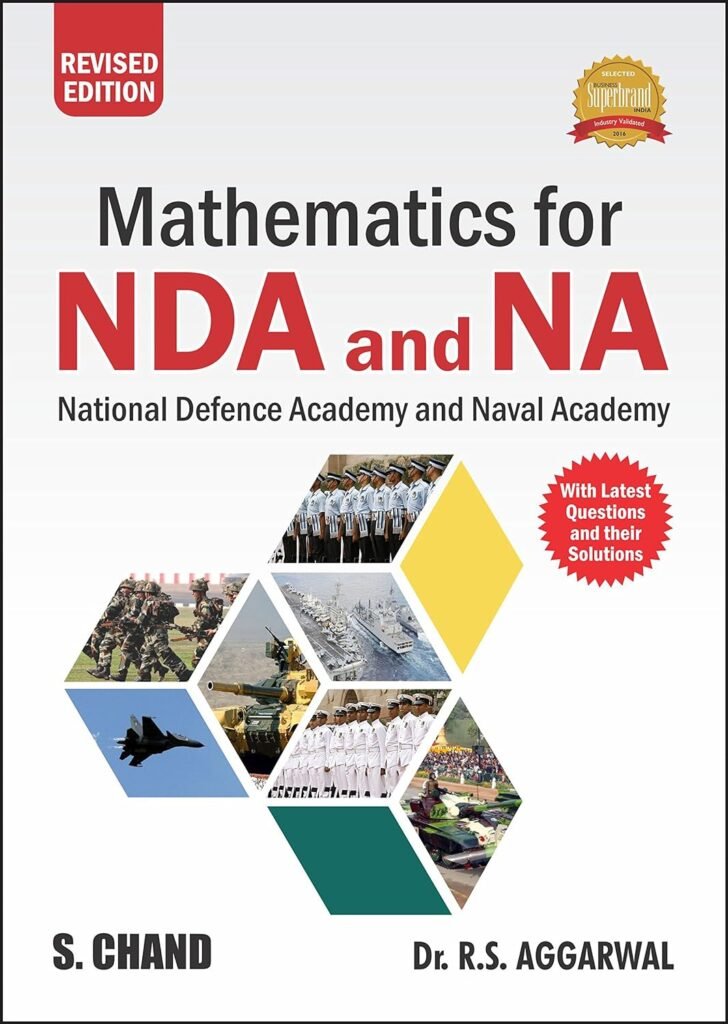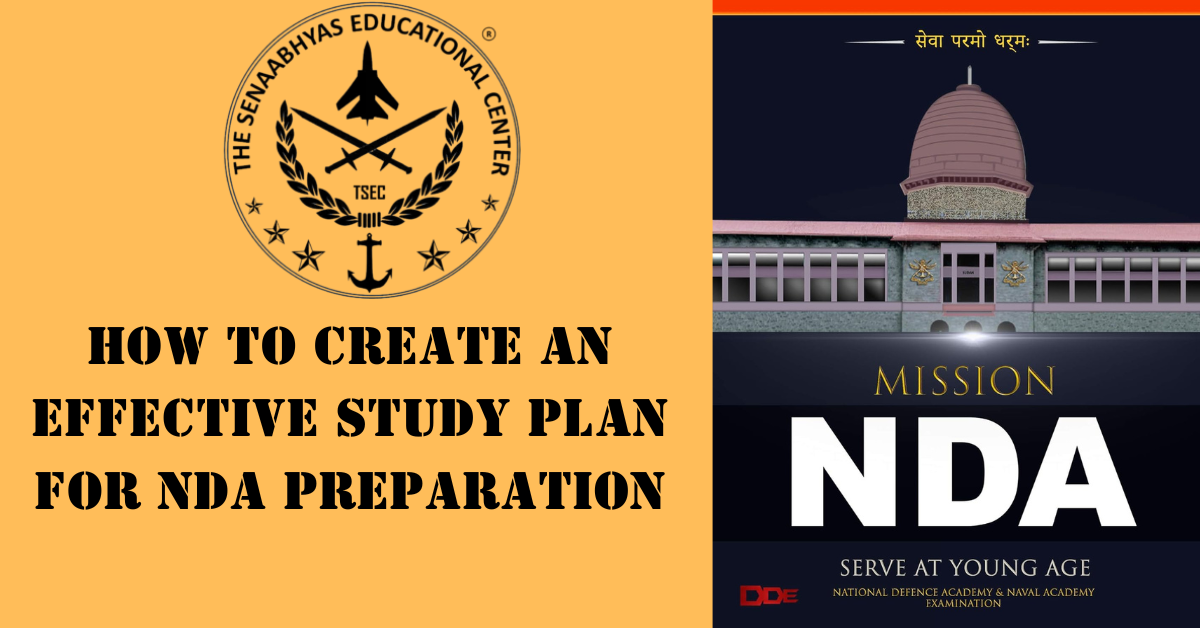Preparing for the National Defence Academy (NDA) exam can be a daunting task. With the right approach and a well-structured study plan, you can navigate through the preparation smoothly and effectively. Let’s dive into creating a comprehensive and effective Study Plan For Your NDA Preparation.
Importance of NDA Preparation:-
The NDA exam is your gateway to a prestigious career in the Indian Armed Forces. It is highly competitive, and thorough preparation is essential to succeed. An effective study plan helps you stay organized, manage your time efficiently, and cover all the necessary topics.
Why a Study Plan is Crucial:-
A Study Plan For NDA Preparation acts as a roadmap, steering you through your preparation journey. It ensures you dedicate ample time to each subject, practice consistently, and stay aligned with your goals. Without a study plan, it’s easy to lose focus and overlook critical topics.
Understanding the NDA Exam:-
Overview of the NDA Exam Structure
In your Study Plan For NDA Preparation, remember that the NDA exam includes two papers: Mathematics and the General Ability Test (GAT). Both are objective-type exams designed to assess your knowledge and understanding of different subjects.
Subjects Covered in the NDA Exam:-
Mathematics
This section covers topics like Algebra, Trigonometry, Calculus, Statistics, Probability, and more. It tests your problem-solving skills and mathematical understanding.
General Ability Test (GAT)
The GAT includes sections like English, General Knowledge, Physics, Chemistry, General Science, History, Geography, and Current Affairs. It evaluates your overall intellectual ability and general awareness.
Marking Scheme and Duration:-
Each paper is 2.5 hours duration. Paper I, Mathematics carries 300 marks, while Paper II, GAT is 600 marks. 120 questions will be asked from the Maths section and 150 questions will be there in the GAT paper. In this exam, candidates will earn 2.5 marks for each correct answer for Paper I, and there is a negative marking where 0.83 marks will be deducted for each incorrect answer. For Paper II there will be a negative marking of 1.33 marks.
Setting Your Goals:-
Defining Clear Objectives
Begin your Study Plan For NDA Preparation by setting clear, attainable goals. Determine what you aim to achieve each week and divide your long-term objective of passing the NDA exam into smaller, manageable tasks.
Short-Term vs Long-Term Goals
Your long-term goal is to clear the NDA exam. Short-term goals can include completing specific chapters, mastering certain topics, or scoring well in mock tests.
Assessing Your Current Level:-
Evaluating Strengths and Weaknesses
Identify your strong and weak areas. This will help you focus more on the subjects that need improvement. Use diagnostic tests and previous exam papers to evaluate yourself.
Taking Practice Tests
Regular practice tests are crucial. They help you get used to the exam format and time constraints, and they highlight areas where you need more practice.
Creating a Study Schedule:-
Daily Study Routine
Morning Session
Start your day with subjects that require the most focus, like Mathematics. Spend 2-3 hours on this session.
Afternoon Session
After a short break, tackle the GAT subjects. Dedicate about 2 hours to this session.
Evening Session
Use the evening for revision and practice tests. Spend around 2 hours on this session.
Weekly Study Plan
Develop a weekly Study Plan For NDA Preparation that includes all subjects. Allocate additional time to challenging topics, but make sure to review each subject consistently.
Balancing Study and Leisure
It’s essential to take breaks and relax. Balance your study schedule with leisure activities to avoid burnout.
Study Techniques:-
Active Learning Strategies
Engage in active learning by questioning, summarizing, and discussing topics. This enhances understanding and retention.
Develop a habit of taking concise, organized notes. Highlight key points and create summaries for quick revision.
Effective Note-Taking:-
Using Flashcards and Mnemonics
Flashcards are great for memorizing facts and formulas. Mnemonics can help you remember complex information easily.
Time Management:-
Prioritizing Subjects
Prioritize subjects based on your strengths and weaknesses. Spend more time on challenging areas without neglecting your strong points.
Allocating Time for Revision
Regular revision is essential. Allocate specific time slots for revising previously covered topics to reinforce your learning.
Staying Motivated:-
Setting Rewards
Reward yourself for achieving study goals. It could be a treat, a short break, or anything that motivates you.
Staying Positive
Maintain a positive attitude. Believe in your abilities and stay confident about your preparation.
Diet and Health:-
Importance of a Balanced Diet
A balanced diet fuels your brain and keeps you healthy. Ensure you eat nutritious meals to maintain energy levels.
Sample Diet Chart for a Week

| Day | Breakfast | Lunch | Dinner | Snacks |
|---|---|---|---|---|
| Monday | Vegetable Upma with mixed vegetables (carrots, peas, beans), A glass of fresh orange juice | Chapati (whole wheat), Mixed vegetable curry (potatoes, carrots, beans, peas), Cucumber and tomato salad, A glass of buttermilk | Brown rice, Palak paneer (spinach and cottage cheese), A bowl of mixed vegetable raita | Nuts, Yogurt |
| Tuesday | Poha with peanuts and green peas, A glass of fresh apple juice | Chapati, Chana masala (chickpea curry), Beetroot and carrot salad, A glass of lassi | Quinoa(cornmeal), Baingan Bharata (mashed eggplant curry), A bowl of curd | Fruits, Seeds |
| Wednesday | Moong dal chilla (lentil pancakes) with green chutney, A glass of fresh mango juice | Chapati, Aloo gobi (potato and cauliflower curry), Spinach salad with lemon dressing, A glass of buttermilk | Jeera rice (cumin rice), Mixed vegetable dal, A bowl of cucumber raita | Veggie Sticks, Hummus |
| Thursday | Idli with sambar (lentil and vegetable stew), A glass of fresh pineapple juice | Chapati, Methi matar malai (fenugreek and peas in cream sauce), Carrot and cabbage salad, A glass of lassi | Millets, Vegetable korma, A bowl of plain yogurt | Protein Bars |
| Friday | Vegetable Paratha (stuffed flatbread) with curd, A glass of fresh watermelon juice | Chapati, Rajma (kidney bean curry), Cabbage and carrot salad, A glass of buttermilk | Brown rice, Bhindi masala (spiced okra), A bowl of mint raita | Smoothie, Nuts |
| Saturday | Masala dosa with coconut chutney, A glass of fresh guava juice | Chapati, Paneer tikka masala (cottage cheese in spiced gravy), Spinach and cucumber salad, A glass of lassi | Quinoa(cornmeal), Mixed vegetable curry, A bowl of curd | Fruits, Yogurt |
| Sunday | Stuffed paratha (potato or paneer) with pickle, A glass of fresh pomegranate juice | Chapati, Dal Tadka (tempered lentils), Tomato and onion salad, A glass of buttermilk | Jeera rice, Mixed vegetable stew, A bowl of plain yogurt | Veggie Sticks, Hummus |
Daily Routine for NDA Aspirants:-
Study and Sleep Schedule
| Time | Activity |
|---|---|
| 5:30 AM | Wake Up, Freshen Up |
| 6:00 AM | Exercise |
| 7:00 AM | Breakfast |
| 8:00 AM | Morning Study Session |
| 11:00 AM | Short Break |
| 11:30 AM | Continued Study |
| 1:30 PM | Lunch Break |
| 2:30 PM | Afternoon Study Session |
| 5:00 PM | Short Break |
| 5:30 PM | Evening Revision Session |
| 7:30 PM | Dinner |
| 8:30 PM | Leisure/Relaxation Time |
| 10:00 PM | Light Revision/Reading |
| 11:00 PM | Sleep |
Physical Fitness Routine
Incorporate physical activities like running, push-ups, sit-ups, and yoga into your daily routine. Physical fitness is a key component of the NDA selection process.
Using Resources Wisely
Recommended Books For NDA Exam Preparation:-
- Mathematics: “Mathematics for NDA and NA” by R.S. Aggarwal
- General Knowledge: “General Knowledge 2024” by Arihant Experts
- English: “Objective General English” by S.P. Bakshi
- Objective GK: “Sanjiv Kumar (Lucent Publication)”
- NCERT 11th and 12th Books

Online Resources and Apps
Use online platforms like Senaabhyas Educational Center, Khan Academy, Coursera, etc. for NDA preparation apps for additional study materials and practice tests.
Group Study vs Self Study:-
Benefits of Group Study
Group study allows for discussion, clarification of doubts, and motivation from peers. It can make learning more engaging and less monotonous.
Advantages of Studying Alone
The self-study provides flexibility and a personalized learning pace. It allows you to focus on your weak areas without distractions.
Mock Tests and Previous Year Papers:-
Importance of Mock Tests
Mock tests simulate the actual exam environment. They help you manage time, understand the exam pattern, and identify areas needing improvement.
Analyzing Previous Year Papers
Previous year’s papers give you an idea of the types of questions asked. Analyzing them helps in understanding the exam trend and preparing accordingly.
Staying Updated with Current Affairs:-
Daily News Reading
Stay updated with current events by reading newspapers and watching news channels daily. This is crucial for the GAT section.
Monthly Magazines and Journals
Refer to monthly magazines like “Pratiyogita Darpan” and journals to cover current affairs and general knowledge comprehensively.
Stress Management:-
Techniques to Handle Stress
Practice deep breathing, meditation, and mindfulness to manage stress. Regular physical exercise also helps in reducing anxiety.
Relaxation Exercises
Engage in activities like yoga, listening to music, or hobbies to relax your mind and body.
Conclusion:-
Creating an effective Study Plan For NDA Preparation involves setting clear goals, understanding the exam structure, and maintaining a balanced routine. Focus on your strengths, work on your weaknesses, and stay consistent with your preparation. Remember, persistence and hard work are key to cracking the NDA exam.
FAQs:-
1. What is the ideal duration of study each day?
Aim for 6-8 hours of focused study every day, with regular breaks to avoid burnout.
2. How do we handle difficult subjects?
Break them into smaller, manageable parts, and tackle them gradually. Seek help from teachers or peers if needed.
3. What are the best online resources for NDA preparation?
Platforms like Khan Academy, Coursera, and various NDA preparation apps offer excellent study materials and practice tests.
4. How to balance physical fitness with studies?
Incorporate short, regular exercise sessions into your daily routine to stay fit without compromising study time.
5. What to do a day before the exam?
Revise key points, relax, get a good night’s sleep, and stay confident. Avoid last-minute cramming.
Follow us on:- Facebook, Instagram, Twitter, YouTube
Learn More With Us:- What is NDA (National Defence Academy), Mastering the NDA Entrance Exam, The Development of The NDA Institute in Agra, Best NDA Coaching Center In Agra



